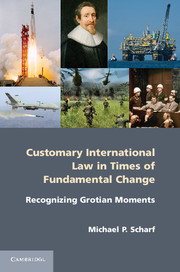Book contents
- Frontmatter
- Contents
- Author’s Biography
- Acknowledgments
- 1 Introduction
- 2 Historical Context
- 3 Theoretical Underpinnings
- 4 Nuremberg
- 5 The Truman Proclamation on the Continental Shelf
- 6 Outer Space Law
- 7 The Yugoslavia Tribunal’s Tadic Decision
- 8 The 1999 NATO Intervention
- 9 The Response to 9/11
- 10 Conclusion
- Index
- References
2 - Historical Context
Published online by Cambridge University Press: 05 June 2013
- Frontmatter
- Contents
- Author’s Biography
- Acknowledgments
- 1 Introduction
- 2 Historical Context
- 3 Theoretical Underpinnings
- 4 Nuremberg
- 5 The Truman Proclamation on the Continental Shelf
- 6 Outer Space Law
- 7 The Yugoslavia Tribunal’s Tadic Decision
- 8 The 1999 NATO Intervention
- 9 The Response to 9/11
- 10 Conclusion
- Index
- References
Summary
This chapter describes the historic underpinnings of the Grotian Moment concept. In the mid-1600s, at the time that the nation-state was emerging as the fundamental political unit of Europe, Hugo Grotius – theologian, poet, historian, jurist, statesman, diplomat, and international lawyer – offered a new concept of international law designed to reflect and progressively develop that new reality. The chapter explains why Grotius is often characterized as “the father of international law”; the role played by his great work, De Jure Belli ac Pacis (“The Law of War and Peace”), in transforming international law; and why it is appropriate to characterize fundamental changes that spark rapid formation of customary international law as “Grotian Moments.”
The Life and Times of Hugo Grotius
To comprehend the Grotian legacy, one must know something about the turbulent times in which Grotius lived and wrote. Hugo de Groot (young Hugo would subsequently adopt the Latinized “Grotius”) was born to one of the leading Protestant families of the Dutch city of Delft on April 10, 1583. He grew up during the Eighty Years’ War (1558–1648) between the Dutch Provinces and the Spanish Empire, and as an adult Grotius witnessed the horrors of the Thirty Years’ War (1618–48), which engulfed the whole of Europe.
- Type
- Chapter
- Information
- Customary International Law in Times of Fundamental ChangeRecognizing Grotian Moments, pp. 13 - 28Publisher: Cambridge University PressPrint publication year: 2013



